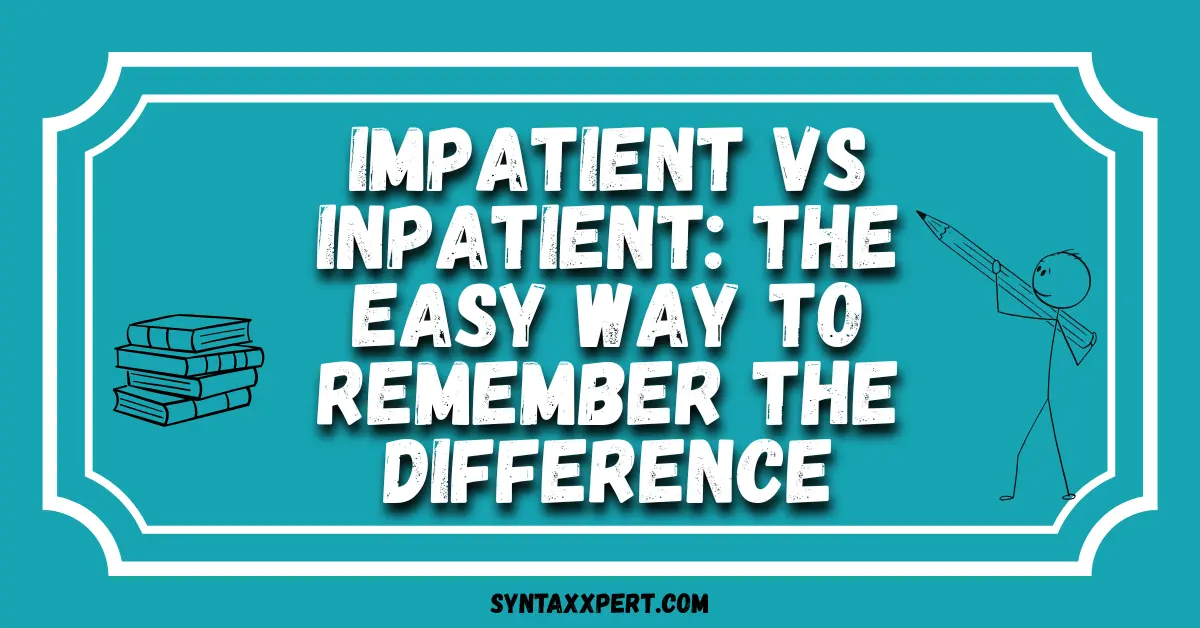Impatient vs Inpatient — they sound almost identical, right? Yet these two little words carry completely different meanings. One expresses a feeling, while the other describes a medical condition. And because both begin with “in,” they confuse thousands of people every single day.
If you’ve ever written “I’m inpatient to see you” in a message and then realized it looks odd — don’t worry. You’re not alone! Many native speakers and learners mix them up. In this guide, we’ll break down what each word means, how to use them correctly, and share easy tricks to remember the difference once and for all.
Quick Difference Between Impatient and Inpatient
Let’s clear things up in one glance before diving deeper:
| Word | Part of Speech | Meaning | Example |
| Impatient | Adjective | Feeling restless or annoyed while waiting | I’m getting impatient with this slow Wi-Fi! |
| Inpatient | Noun / Adjective | A person who stays in a hospital for treatment | After surgery, he was admitted as an inpatient. |
Simple Tip: If it’s about feelings, use impatient. If it’s about hospitals, use inpatient.
What Does “Impatient” Mean?
Impatient means being eager, anxious, or annoyed because something isn’t happening fast enough. It’s an emotional response — not a medical term.
Examples:
- Emily grew impatient waiting for her online order.
- Kids get impatient before opening birthday gifts.
- The impatient driver honked even before the light turned green.
Synonyms: restless, anxious, eager, irritated, edgy. Antonyms: patient, calm, relaxed, tolerant.
Quote to remember: “Patience is not the ability to wait, but how you act while waiting.” — Joyce Meyer
Grammar Note: “Impatient” is always an adjective. You can describe a person, reaction, or mood as impatient — but you can’t “be” an impatient (noun).
What Does “Inpatient” Mean?
Inpatient has nothing to do with emotion — it’s a medical term. It refers to a patient admitted to a hospital who stays overnight (or longer) for treatment or observation.
Examples:
- The hospital’s inpatient department was full last night.
- Mark became an inpatient after his knee surgery.
- Inpatient care is usually more intensive than outpatient treatment.
Synonyms: hospitalized patient, admitted patient. Antonyms: outpatient, visitor.
Fun Fact: The term inpatient first appeared in the 19th century when hospitals began tracking patients who required overnight care.
Impatient vs Inpatient in Sentences
| Sentence | Correct Word | Why |
| She grew __ waiting for the nurse. | Impatient | Describes her emotional state. |
| He was admitted as an __ after surgery. | Inpatient | Describes his hospital status. |
| The __ unit was recently renovated. | Inpatient | Refers to a hospital department. |
| The teacher became __ when the class wouldn’t listen. | Impatient | Expresses frustration. |
So next time you’re unsure, just ask: Am I describing a feeling or a hospital stay?
Etymology: Where the Words Come From
| Word | Root | Origin Meaning | Language |
| Impatient | im- (not) + patient (able to wait) | “Not able to wait or tolerate delay” | Latin via Old French |
| Inpatient | in- (inside) + patient | “A patient inside the hospital” | English formation |
Memory Trick: “Inpatient” starts with “in” — think “inside” the hospital. “Impatient” starts with “im” — think “I’m annoyed.”
When to Use Impatient (Emotional Contexts)
Use impatient whenever someone feels frustrated, eager, or restless. It’s common in everyday language, emails, and conversations.
Examples:
- I’m getting impatient waiting for your reply.
- Parents grow impatient when kids ignore bedtime.
- She sounded impatient on the phone.
Real-world Tip: Writers and marketers often use “impatient” to describe human behavior, like in headlines:
“Why People Are Becoming More Impatient in the Digital Age.”
When to Use Inpatient (Medical Contexts)
Use inpatient only when referring to hospital or clinical situations. It’s a formal term used in healthcare, insurance, and documentation.
Examples:
- Inpatient care involves a longer hospital stay.
- The doctor specializes in inpatient rehabilitation.
- Inpatient treatment costs are often covered by insurance.
Did you know? According to the American Hospital Association, over 33 million inpatient admissions happen every year in the U.S. — proving how essential the term is in medical communication.
Impatient vs Inpatient: Real-Life Example
Case Study: Sarah’s Surgery Story Sarah had a minor heart surgery. She stayed in the hospital for three nights — that made her an inpatient.
However, during recovery, she grew impatient because she wanted to return home sooner.
Lesson: You can be an inpatient and feel impatient at the same time!
Impatient vs Inpatient in Professional Writing
If you’re a writer, student, or healthcare worker, using the wrong term can completely change your meaning.
| Context | Correct Term | Example |
| Email to a friend | Impatient | I’m impatient for the weekend! |
| Medical record | Inpatient | The patient was admitted as an inpatient on Nov 8. |
| Blog or article | Impatient | People today are more impatient than ever. |
| Healthcare form | Inpatient | Inpatient care requires overnight admission. |
Always choose based on context, not sound.
Common Confusion and How to Avoid It
Here are the top mistakes people make (and how to fix them):
| Mistake | Correction | Why |
| I was inpatient for the results. | I was impatient for the results. | It’s about emotions, not hospitals. |
| The impatient care center is full. | The inpatient care center is full. | Refers to hospital services. |
| He’s an impatient at the clinic. | He’s an inpatient at the clinic. | “Impatient” isn’t a noun. |
Quick Mnemonic:
INpatient = IN hospital IMpatient = I’M annoyed
Expert Tip: Word Families Help
The root word patient can change meaning with prefixes:
| Word | Prefix | Meaning |
| Patient | — | Calm, able to wait |
| Impatient | im- (not) | Can’t wait; restless |
| Inpatient | in- (inside) | Hospitalized person |
Notice how “im-” negates the meaning (not patient), while “in-” changes it to location (inside hospital).
SEO Insights: Keyword Associations
Search engines link “Impatient vs Inpatient” with related queries like:
- difference between impatient and inpatient
- inpatient vs outpatient
- impatient meaning and examples
- inpatient meaning medical
- inpatient care vs outpatient care
- impatient pronunciation
These related keywords improve your topical authority when naturally included in content — helping your article rank higher on Google.
Quotes About Patience (To Remember “Impatient”)
“Adopt the pace of nature: her secret is patience.” — Ralph Waldo Emerson
“Patience is bitter, but its fruit is sweet.” — Aristotle
These quotes can help you remember that impatient describes a lack of patience, not a hospital stay.
Outpatient vs Inpatient: Bonus Comparison
People often confuse inpatient and outpatient too, especially in healthcare.
| Term | Meaning | Example |
| Inpatient | Stays overnight or longer for treatment | Inpatient rehabilitation lasted 7 days. |
| Outpatient | Visits hospital or clinic but doesn’t stay overnight | Outpatient therapy was scheduled twice a week. |
🏥 Healthcare Tip: Inpatient care is typically more intensive and expensive, while outpatient care is for shorter procedures.
Mini Grammar Guide
| Category | Impatient | Inpatient |
| Type | Adjective | Noun / Adjective |
| Context | Emotions, behavior | Medicine, healthcare |
| Common Use | “I’m impatient waiting for news.” | “He’s an inpatient recovering after surgery.” |
| Opposite | Patient | Outpatient |
Fun Facts You Didn’t Know
- The prefix “im-” in “impatient” doesn’t mean “inside” — it means “not.”
- Hospitals use “inpatient” units to separate long-term patients from outpatient departments.
- “Impatient” appears more frequently in literature, while “inpatient” dominates medical documents.
- Spell checkers often miss errors between the two — so proofreading is key!
Real-World Usage Frequency
According to Google Ngram Viewer (which tracks word usage in books), “impatient” is far more common in general English, while “inpatient” is rare outside medical writing.
So, if you’re writing anything non-medical, impatient is almost always your word.
READ MORE >>> Bearer or Barer – Meaning, Difference, and Grammar Explained
How to Remember the Difference (Forever)
Here’s a quick summary you’ll never forget:
| Clue | Word | Meaning |
| “I’m annoyed” | Impatient | Restless or eager |
| “In hospital” | Inpatient | Admitted for treatment |
✅ One-Line Memory Hack: If you’re in a hospital bed, you’re an inpatient. If you’re sick of waiting in that bed, you’re impatient.
Frequently Asked Questions
Can someone be both impatient and inpatient?
Absolutely! If a person in the hospital feels frustrated with recovery, they’re both an inpatient and impatient.
What’s the opposite of impatient?
The opposite is patient, meaning calm and tolerant despite delays.
What’s the main difference between inpatient and outpatient?
Inpatient involves staying overnight; outpatient means same-day treatment without staying.
Is “impatient” ever used in a medical sense?
No. “Impatient” always refers to emotion, never medical context.
Why do people confuse these words?
Because both start with “in” and sound alike, but only one relates to feelings — the other to hospitals.
Conclusion
At first glance, Impatient vs Inpatient seems tricky, but the difference is actually simple once you see it clearly.
Impatient describes a feeling of restlessness, eagerness, or frustration — something emotional and human. Inpatient, on the other hand, refers to a person admitted to a hospital for treatment — something clinical and factual.
So next time you’re writing, just remember:
If it’s about feelings, choose impatient. If it’s about hospitals, choose inpatient.
Now, you’ll never mix them up again — and that’s something to be patiently proud of. 😄

I’m Luna Hazel, a grammar expert here to help you master the art of clear, confident writing. Let’s make every word count!

